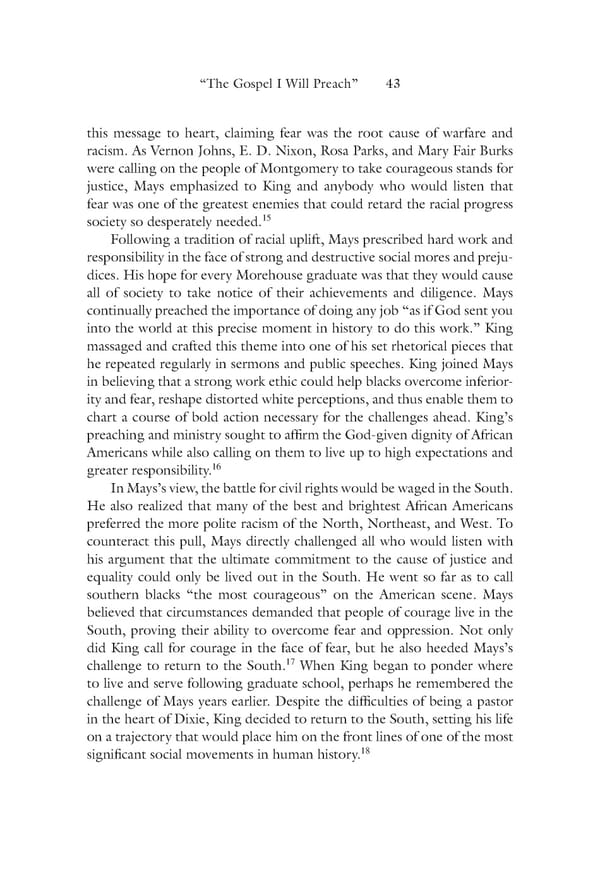“The Gospel I Will Preach” 43 this message to heart, claiming fear was the root cause of warfare and racism. As Vernon Johns, E. D. Nixon, Rosa Parks, and Mary Fair Burks were calling on the people of Montgomery to take courageous stands for justice, Mays emphasized to King and anybody who would listen that fear was one of the greatest enemies that could retard the racial progress 15 society so desperately needed. Following a tradition of racial uplift, Mays prescribed hard work and responsibility in the face of strong and destructive social mores and preju- dices. His hope for every Morehouse graduate was that they would cause all of society to take notice of their achievements and diligence. Mays continually preached the importance of doing any job “as if God sent you into the world at this precise moment in history to do this work.” King massaged and crafted this theme into one of his set rhetorical pieces that he repeated regularly in sermons and public speeches. King joined Mays in believing that a strong work ethic could help blacks overcome inferior- ity and fear, reshape distorted white perceptions, and thus enable them to chart a course of bold action necessary for the challenges ahead. King’s preaching and ministry sought to affirm the God-given dignity of African Americans while also calling on them to live up to high expectations and 16 greater responsibility. In Mays’s view, the battle for civil rights would be waged in the South. He also realized that many of the best and brightest African Americans preferred the more polite racism of the North, Northeast, and West. To counteract this pull, Mays directly challenged all who would listen with his argument that the ultimate commitment to the cause of justice and equality could only be lived out in the South. He went so far as to call southern blacks “the most courageous” on the American scene. Mays believed that circumstances demanded that people of courage live in the South, proving their ability to overcome fear and oppression. Not only did King call for courage in the face of fear, but he also heeded Mays’s 17 When King began to ponder where challenge to return to the South. to live and serve following graduate school, perhaps he remembered the challenge of Mays years earlier. Despite the difficulties of being a pastor in the heart of Dixie, King decided to return to the South, setting his life on a trajectory that would place him on the front lines of one of the most significant social movements in human history.18
 Becoming King: Martin Luther King Jr. Page 63 Page 65
Becoming King: Martin Luther King Jr. Page 63 Page 65